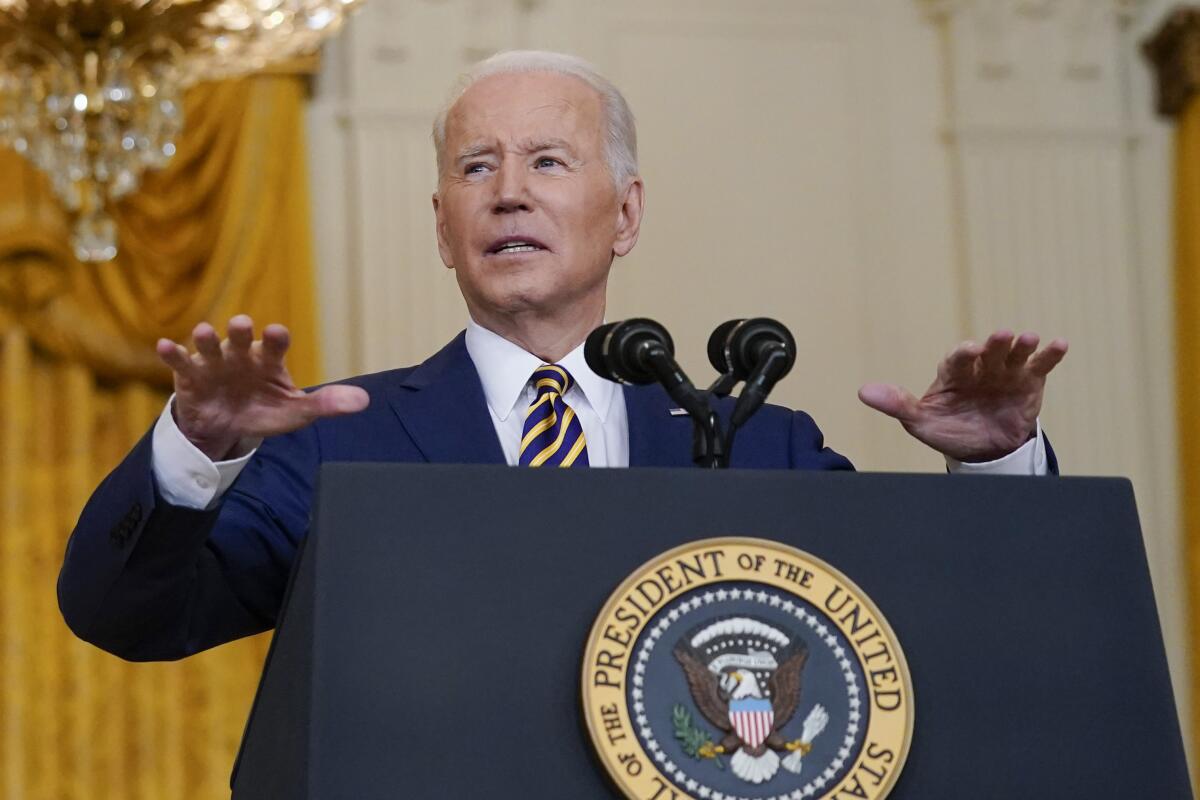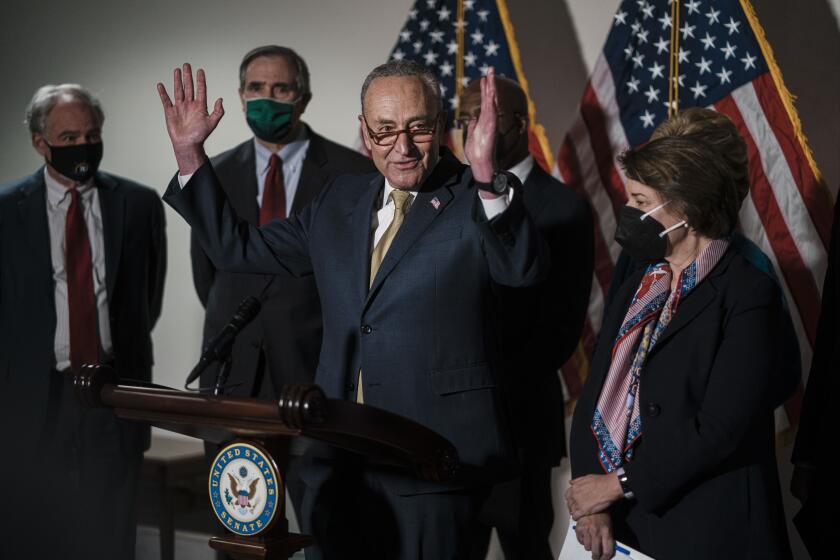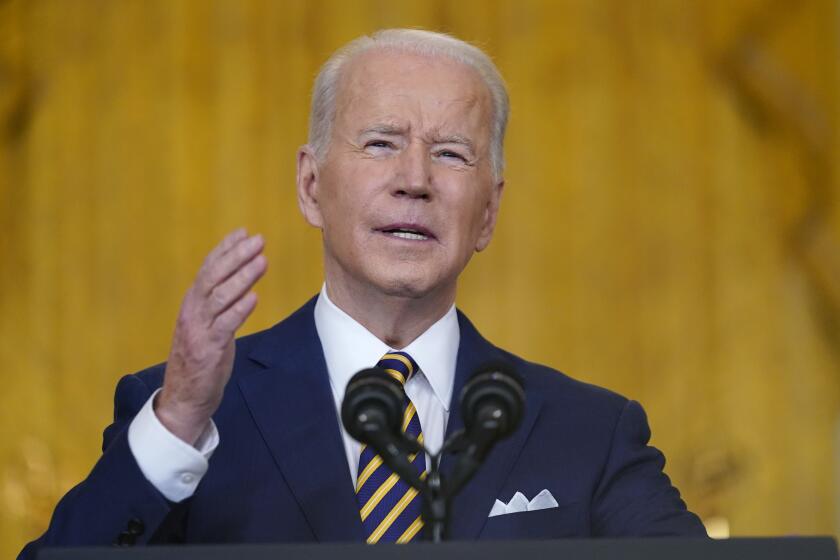Amid criticism, Biden walks back his suggestion that future elections might not be ‘legit’

- Share via
WASHINGTON — A day after President Biden suggested GOP voter suppression tactics could delegitimize future elections, the White House worked to steer clear of a political trap, beating back criticism that the president was sowing doubt about elections and weakening American democracy.
During a lengthy White House news conference marking the end of his first year in office, Biden said he thought the November midterm elections “could easily be ... illegitimate” if Democrats in Congress fail to muster a legislative response to new GOP restrictions on voting enacted last year in 19 states. “The prospect of being illegitimate is in direct proportion to us not being able to get these — these reforms passed,” he said.
Unlike the bogus election fraud claims promulgated by former President Trump and countless Republicans for the last two years, Biden’s comments were not reflections of prioritizing self-interest over democracy itself, administration officials said. Rather, they asserted, the president was justified in sharply questioning GOP efforts to restrict mail voting and enable partisan lawmakers in some states to change vote counts. Those Republican-led election overhauls, in large part, have been undertaken largely based on Trump’s lies about the last election’s outcome.
Vice President Kamala Harris said during an interview Thursday morning on NBC’s “Today” that Democrats have good reason to be worried about “this blatant erosion of our democracy and in particular the right of all Americans who are eligible to vote to have access to the ballot unfettered.”
Biden’s alarmism has nonetheless opened him up to criticism — from some democracy watchers concerned about eroding public trust in institutions and, less surprisingly, Republicans. GOP lawmakers jumped at the chance Thursday to equate the president’s comments with Trump’s brazen and sustained attacks on the voting process and elections, hoping to muddy the issue with a flurry of accusations about who is really to blame for imperiling American democracy.
“Lets be clear: @potus was not casting doubt on the legitimacy of the 2022 election,” Jen Psaki, the White House press secretary, responded on Twitter Thursday. “He was explaining that the results would be illegitimate if states do what the former president asked them to do after the 2020 election: toss out ballots and overturn results after the fact. The Big Lie is putting our democracy at risk. We’re fighting to protect it.”
Asked later if Biden believes the midterm election results will be legitimate even if Democrats fail to respond to GOP voting restrictions, Psaki was succinct: “Yes,” she said.
Trump suggested throughout the 2020 campaign that the use of mail ballots would spark widespread fraud (there is no evidence it did). He declared himself the winner on election night long before the outcome was clear. And then, having lost, Trump pressured his own vice president not to certify the result. When Vice President Mike Pence refused, Trump encouraged a mob of his supporters to storm the Capitol in a final and ultimately violent attempt to “stop the steal.” Trump was impeached — for the second time in his presidency — for inciting the riot.
Dominik Whitehead, the vice president of campaigns at the NAACP, said there’s a clear difference between what voting rights advocates and Democrats say is happening in some Republican-led states and what Trump claimed happened in the 2020 election.
“We have to look at what happens in these states,” Whitehead said. Voting rights advocates and Democrats aren’t questioning the integrity of U.S. elections, he said, but are raising awareness about the need for laws to prevent people from being denied access to the ballot box.
Republicans, however, did not recognize much distinction between Biden’s words and Trump’s actions. Less than 24 hours after Senate Democrats tried and failed to change Senate rules to advance stalled voting rights legislation, several GOP lawmakers pummeled Biden for questioning the fairness of an upcoming election.
Democrats get their second high-profile setback in as many months as Republicans block voting rights bills.
“It all sounds eerily familiar,” said Senate Minority Leader Mitch McConnell (R-Ky.) in a speech on the Senate floor. “The Democrats, who preach countless sermons about accepting voters’ decisions, are now saying the midterms may be illegitimate unless they win.”
McConnell mischaracterized Biden’s remarks. The president did not suggest a future election could only be deemed legitimate if he or his party are victorious.
Sen. Mitt Romney (R-Utah), who like McConnell has criticized Trump’s incessant lying about the 2020 election, offered a more straightforward condemnation of Biden’s comments.
“It is irresponsible for an American president, in any way, to delegitimize an election,” Romney tweeted. “Without question, our elections are fair and legitimate. This is the same unfortunate path the former president went down and as we know, it is a dangerous and divisive course. It was unacceptable then and it is unacceptable now.”
At a news conference closing his first year in office, Biden celebrates his accomplishments and vows to push past obstacles to his domestic agenda.
Election officials and experts share Romney’s view, concerned about any rhetoric that could contribute to a growing defeatism about democracy, especially if the issue itself becomes just another partisan fault line.
“You cannot talk about free and fair elections without sounding partisan at this point. That’s a fundamental problem,” said Nate Persily, an election integrity expert at Stanford Law School. There’s a growing sense, he continued, “that democracy and elections are a game — that it’s not about a way of granting legitimacy to our leadership, but who can seize power by whatever means necessary.”
Rebecca Green, the co-director of the Election Law Program at William & Mary Law School, said “it feels like the rhetoric on both sides makes it seem as if our system of elections is doomed. There are a lot of reasons to have faith in very hard working election officials who are administering rules to enable every eligible American voter to cast a ballot.”
Many Republicans still believe President Trump’s ‘Big Lie’ that the 2020 election was stolen, according to a report that raises fears for U.S. democracy.
Green said that, in some ways, it’s easier to vote than ever, due to laws in some states that have expanded early and absentee voting and automatic voter registration. Even in states such as Georgia where new laws have made it harder to vote, advocates shouldn’t make it sound impossible to cast a ballot, she said.
Republican strategist Alex Conant described a “trend for both parties casting doubt on the elections that they don’t win” that predates the 2020 election, pointing to Stacey Abrams’ decision not to concede to Republican Brian Kemp due to allegations of voter suppression after she lost the 2018 Georgia gubernatorial race.
“It’s indisputable that, whereas 20 years ago, both parties willingly conceded major elections that they lost, both parties are now more likely to raise questions about the integrity of an election they lost,” he said, noting that the losing party’s willingness to accept defeat is critical in a functioning democracy.
“I’m less concerned about what either party says about [the 2022 midterm elections] today than what they say on election night after the votes have been counted,” Conant said.
More to Read
Get the L.A. Times Politics newsletter
Deeply reported insights into legislation, politics and policy from Sacramento, Washington and beyond. In your inbox twice per week.
You may occasionally receive promotional content from the Los Angeles Times.














